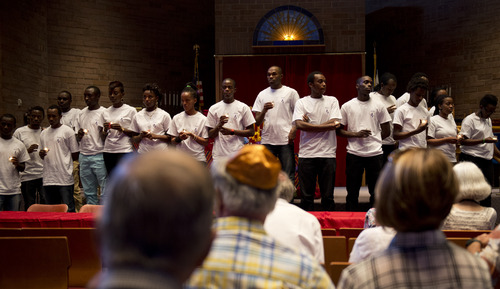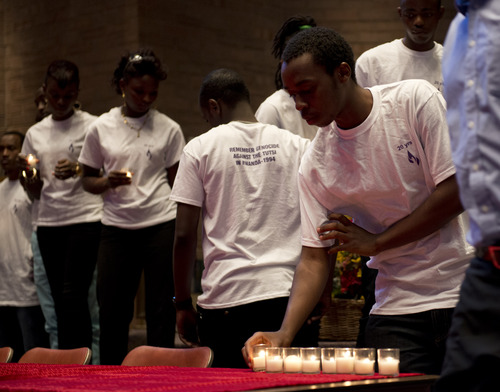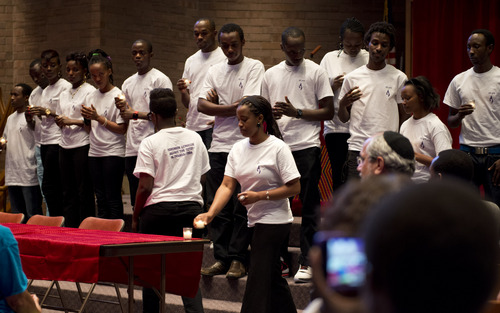This is an archived article that was published on sltrib.com in 2014, and information in the article may be outdated. It is provided only for personal research purposes and may not be reprinted.
Eric Nkurunziza can see his mother's face in his 10-month old daughter Ilana, who he held just after lighting a 20th candle to commemorate the number of years since Hutus in Rwanda killed his father, mother, three sisters and a younger brother.
"That gives me a better feeling," Nkurunziza said about the resemblance. "In her I see the rebirth of my people."
Nkurunziza and about 100 people gathered Sunday at Congregation Kol Ami in Salt Lake City to talk about what survivors are going through two decades after the genocide and what the Rwandan government is doing to help them. Many survivors, through the help of refugee and relief agencies, have ended up in the Salt Lake Valley where a vibrant Jewish community has supported them by hosting annual commemoration events.
One of this year's event organizers, Patrick Lee, witnessed firsthand the lasting impact of the government-backed Rwandan genocide, which lasted over three months and resulted in the brutal mass killings of as many as 1 million Tutsis and sympathetic Hutus. It's estimated that 70 percent of the Tutsi population in Rwanda was murdered, often by Hutus wielding machetes and clubs.
Lee was volunteering in 2001-2002 in Western Uganda, where he saw Rwandan Tutsis still seeking safe harbor in refugee camps.
"I made a personal connection first," Lee said. "It led me to want to learn more about the history and the context in which (the genocide) occurred. And then it connected me more to the people here and wanting to help."
Lee compared the Rwandan commemorations to the annual Days of Remembrance, which Congress established as a national event to remember the Holocaust.
"I think that's why you find a close connection between those two communities," he said. "You have people who can identify with each other."
Lee and David Sonnenreich this past week helped Utah become only the third state to have a Rwandan Genocide Day of Remembrance. Gov. Gary Herbert signed the declaration, dated June 8, as a show of support for the hundreds of Rwandan Tutsis now living in Utah.
Former state Rep. David Litvack introduced Nkurunziza, Sunday's first speaker, and called the synagogue a "home for all," urging those present to "never forget" the Rwandan genocide.
"We must always hold on to hope that by remembering, by commemorating, by reflecting, that some day, some day we learn the lessons of history and we find a way to stop genocide," Litvack said. "We know that has not happened," he added, referring to more recent killings in Sudan.
Nkurunziza, who was 20 and studying in nearby Democratic Republic of Congo when the killings began, said memories of the genocide still make him feel bad. Only one sister, who was 7 at the time, was "rescued from the bodies."
He's frustrated that justice has not been served to "masterminds" of the killings. He's tried to move on, to stay busy with his family and job that has him working for weeks at a time at an oil field in North Dakota while living in Salt Lake City. He said it helps that he's thousands of miles away from Rwanda, building a "new life" in what he calls a peaceful place. But feelings of revenge and anger always loom.
"You can't prevent them from coming," he said about the dark thoughts. "You learn how to live with them. You try to prevent them. You fight against it."
Nkurunziza lit the 20th candle inside the synagogue Sunday, after 19 young men and women lit candles, each one remembering the friends and relatives, sometimes entire families, that they lost.
Edouard Kayihura was invited to speak and sign copies of his recently published book "Inside The Hotel Rwanda: The surprising true story … and why it matters today."
At Sunday's gathering he talked about fleeing his home, hiding in yards, bushes and trees and tearing up his ID card, which militias were using to find Tutsis before killing them. He sought refuge in the Hotel des Mille Collines, which became known as Hotel Rwanda in a 2004 Academy-award nominated film. His book tells a different story about the hotel owner.
Panelists and speakers Chantal Mudahogora, now a psychotherapist living in Ontario, and Yvette Rugasaguhunga, a representative with the Rwandan Embassy, were invited to talk about the challenges facing genocide survivors. They and other panelists talked about forgoing hatred, learning to live with pain, sorrow and grief, forgiving, trying to understand what led to the hatred and killing and to make "never again" a reality for Rwanda and the rest of the world.







